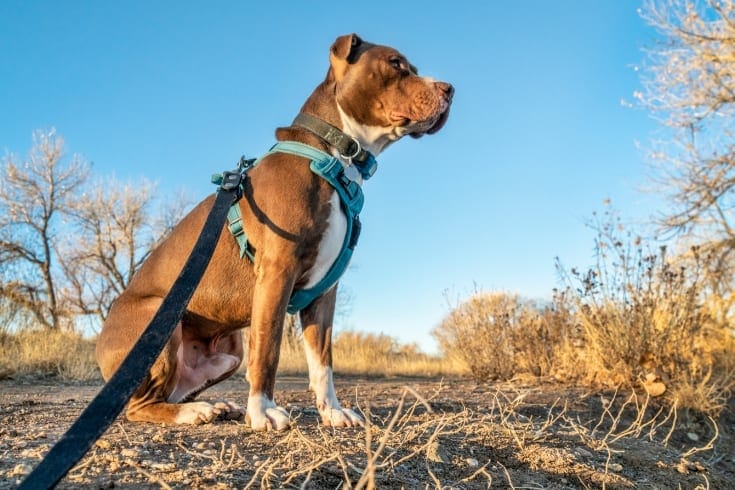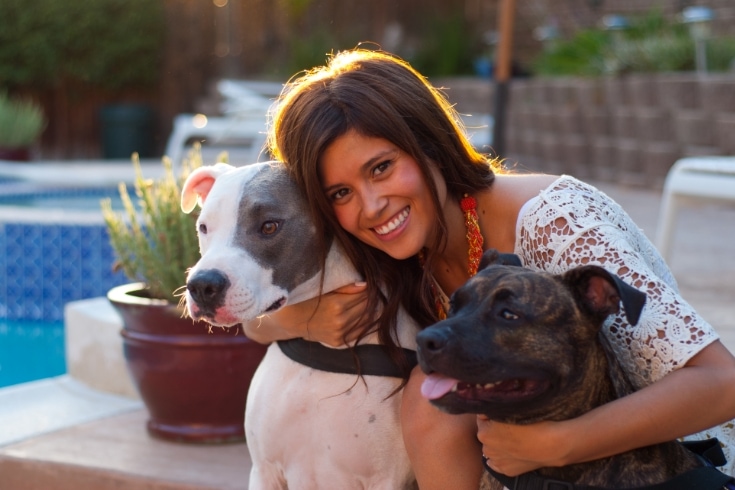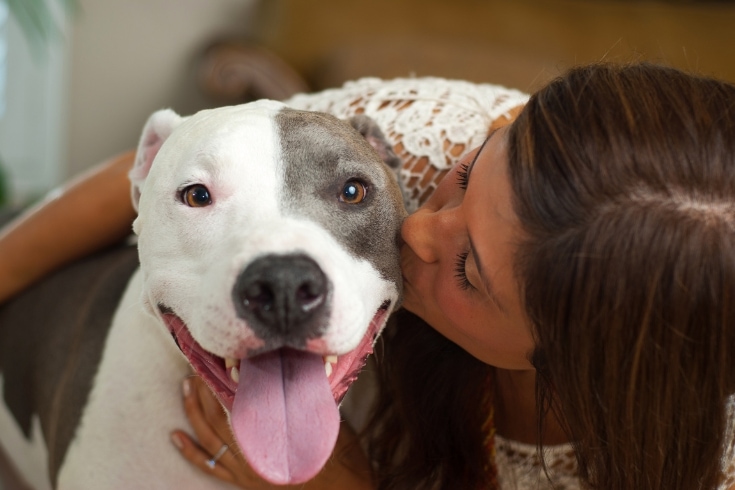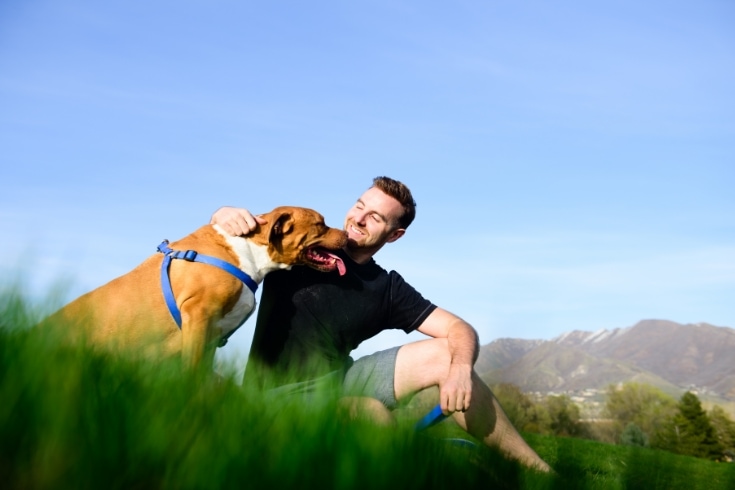Are Pit Bulls really the monsters that they’re often made out to be? Many people shy away from the breed, believing that they have an innate tendency to attack humans. But here’s the truth: most of what we’ve been led to believe about Pit Bulls is simply untrue.
There’s no evidence suggesting that Pit Bulls are any more likely to attack people than other dogs. So, if you’re tired of hearing the same old, poorly informed-claims about these lovable dogs, read on!
Introducing Pit Bulls and Misconceptions

Pit bulls are the four-legged friends that receive more negative publicity than any other breed. But why? Contrary to what some may believe, they did not breed pit bulls to be inherently aggressive. In fact, we once knew them as “nanny dogs” (though this has been disputed for a long time) for their gentle nature around children.
Pit bulls (a catch-all term) are a mixed breed of one type of bully breed and another. The American Pit Bull Terrier is an acknowledged part of the AKC but involves several pit bull-type dogs. The term “pit bull” simply encompasses all bully breeds out there, so it’s unfair to call a pit bull a dangerous dog breed when it includes so many.
Types of dogs considered pit bull-type dogs include:
- Staffordshire Bull Terrier
- Bull Terrier
- American Pit Bull Terrier
- American Staffordshire
- American Bully
The negative stigma surrounding pit bulls comes from their unfortunate use of illegal dog fighting rings. But don’t let misconceptions fool you. These pups can make for loyal and loving pets if they are raised properly, just like any other dog.
So next time you see a pit bull, don’t be afraid to say hello and give them a chance. Just ask first before you approach, as not every dog is a social butterfly. I’ve experienced many times how a dog that doesn’t want to be bothered or isn’t a social butterfly may react in a way most people find unacceptable.
It’s not their fault, and you should always ask for permission to pet a strange dog. Any dog.
The same goes for those who let their “friendly” dog off-leash. Not every dog is friendly to other dogs. I’ve experienced this many times while shouting “My dog isn’t!” at the incoming pooch & owner. I’ve come to the point where I just avoid other dogs, especially in parks & other outdoor venues where people seem to think it’s okay not to leash their dogs.
Socialization and How It Affects a Dog’s Temperament

Have you ever wondered why some dogs are more outgoing while others are more reserved? Well, my friend, it’s all about socialization! Just like us humans, all breeds of dogs can interact with others, learn proper behavior, and develop their temperament.
Without proper socialization and consistent training, dogs can become anxious, fearful, or even aggressive toward other animals and people. So, what can you do to improve your beloved family pet’s social skills?
Here are some steps you can take to socialize your pit bulls properly:
- Start Early: Start socializing your pup as early as possible, usually between 3 and 14 weeks of age when they are more receptive to new experiences.
- Positive Reinforcement: Use positive reinforcement techniques like treats, praise, and play to encourage good behavior and help your dog associate positive experiences with new situations.
- Gradual Exposure: Introduce your dog to new experiences gradually, starting with less overwhelming situations and progressing to more challenging ones as they become more comfortable.
- Varied Environments: Take your dog on walks in different neighborhoods, introduce them to other dogs at the park, and visit pet stores and public places with your pup to expose them to different environments.
- Obedience Training: Enroll your pup in obedience training classes to teach them necessary skills, like how to walk on a leash, sit, stay, and come when called. Training will also help your dog learn proper behavior in different situations.
- Consistency: The key to successful socialization is consistency. Socialize and reinforce positive behavior regularly to help your dog develop their social skills.
The Benefits of Owning a Pit Bull

Have you ever considered the benefits of owning a pit bull? Not only are they incredibly loyal and loving pets, we know pit bulls for their muscular physiques, making them the perfect workout buddy. But don’t let their tough exterior fool you. These pups are affectionate animals at heart and will snuggle up with you on the couch for hours on end.
- Unconditional Love: Dogs provide unparalleled love and affection with no judgment or expectations.
- A Healthier You: Owning a dog encourages the average person to get outside and exercise, reducing stress levels and increasing overall health and well-being.
- Companionship: Your furry friend can be your number one companion, sharing all the difficulties of life together! Dogs are great with their inherent attunement to people.
- Security & Protection: These dogs are notorious for their protective nature; they’ll keep a watchful eye on you at all times!
- Reduced Stress Levels: Studies have shown that petting dogs releases endorphins which help reduce anxiety, depression, loneliness, and other negative emotions caused by stress.
- Positive Impact on Kids & Elderly: Pets often offer joy to those who need it most, such as children or the elderly; they bring smiles to people’s faces when they need it most!
- Fun Activities to Do Together: From going for walks to playing games like fetch in the park; having a pup can open up new possibilities for fun activities with them every day!
- Improved Mental Health: Regular interaction with animals improves mental health as pet owners benefit from increased self-esteem.
Training and Responsible Pet Ownership
From obedience classes to online tutorials, there are endless opportunities for pet owners to learn how to be responsible caretakers. One of the most effective ways to get started is by connecting with local animal shelters or rescue organizations.
There are several out there that have resources for anyone that has a pit bull as they’re more uniquely trained and qualified to train these dogs.
Many offer training classes and workshops on various topics, including obedience and behavioral issues. There are many websites, books, and blogs dedicated to providing helpful tips and advice for pet owners. By taking advantage of these resources, you’ll be well on your way to becoming a knowledgeable and responsible pet owner.
Making a Difference in Your Community With Advocacy and Education

By advocating for pit bulls & educating others, you can help break the negative stereotypes about these lovable pups. Start by attending local events, like adoption fairs or pit bull meetups, & spread the word about responsible ownership & proper training techniques. Engage with your local government officials & push for more pro-pit bull policies.
A lot of anti-pit bull propaganda and breed restrictions are given by those that aren’t as educated about the breed as they should be and draw conclusions that are baseless in most cases. Bans on pit bulls don’t help the situation, and neither does seeing dropping adoptions of pit bulls.
Unfortunately, most shelters don’t mention if a dog is a pit mix because they’re afraid they won’t be adopted. Sadly, a lot of adult pit bulls stay in shelters for a long time before being adopted.
And don’t forget to show off your adorable pit bull on social media, using the hashtag #pitbulllove to bring awareness and support to the cause. Let’s show the world that pit bulls are not only deserving of our love but also our advocacy and education efforts.
FAQs
What are the dangers of having a pit bull?
While there is a common misconception that pit bulls are more likely to be aggressive toward people, it’s crucial to recognize that any breed of dog might be dangerous if not properly trained or socialized.
In fact, statistics show that the most common dog breeds involved in fatal attacks are not pit bulls but are breeds such as German Shepherds, Rottweilers, and even Huskies.
However, it’s also important to note that the vast majority of dogs, regardless of breed, are not aggressive toward people. It’s crucial for dog owners to understand that responsible ownership and proper training are essential for preventing any potential danger or harm.
This includes providing proper exercise and stimulation, obedience training, socialization with people and other animals, and always supervising interactions with children.
Is it safe to have a pit bull around a baby?
It is safe to have a dog around a baby if you are observing them. This is true for any kind of dog, even pit bulls. Dogs can be friendly and nice, but they can also get aggressive if they don’t have the right training or care. So it is important to always supervise your baby or young children when they are near your dog.
How common are pit bull attacks?
Despite the infamous reputation of pit bulls, actual pit bull attacks on humans are relatively rare. In fact, a study conducted by the American Veterinary Medical Association found that pit bulls are not inherently more dangerous than other breeds of dogs and that most pit bulls are well-behaved and friendly toward people.
Statistics show that there is a minute chance of a pit bull actually biting a human. According to the Centers for Disease Control and Prevention, out of the approximately 4.5 million dog bites that occur in the United States each year, pit bulls cause only a small percentage.
In fact, many other breeds of dogs, such as Labrador Retrievers and Chihuahuas, are responsible for more bites than pit bulls.
It’s true some pit bulls have been involved in high-profile attacks on humans, leading to the breed’s negative reputation. But, it’s important to remember that these incidents are the exception rather than the rule. Responsible ownership, proper training, and socialization are key in preventing any potential danger or harm, regardless of the breed of the dog.
How loyal are pit bulls to their owners?
We know pit bulls for their fierce loyalty to their owners. They are incredibly affectionate and crave attention from their humans. As a result, we often refer to them as “velcro dogs” because they never want to be too far away from their owners.
In fact, pit bulls have the instinct to protect their owners, which is why they were originally bred for tasks like guarding livestock and protecting families. This trait has remained with the breed throughout the years, making them fiercely devoted to their owners.
We also know pit bulls to be incredibly empathetic toward their owners. They can sense when their owners are upset or in distress and will often comfort them by snuggling up next to them or licking their faces. This emotional intelligence is just another reason pit bulls make such splendid companions.
Conclusion
I hope this blog post has provided enough information to convince you that pit bulls are incredibly loyal and friendly companions. Despite their unfortunate reputation, they have so much love to give! From training advice to positive advocacy in the community, there is a lot we can do to combat misconceptions about these dogs.
If you already own a pit bull or plan on getting one, celebrate the loyalty and unwavering love it brings into your life. And if you aren’t a “pit bull person” but would still like to take a stand to improve their reputation, then your research and education will speak volumes!
